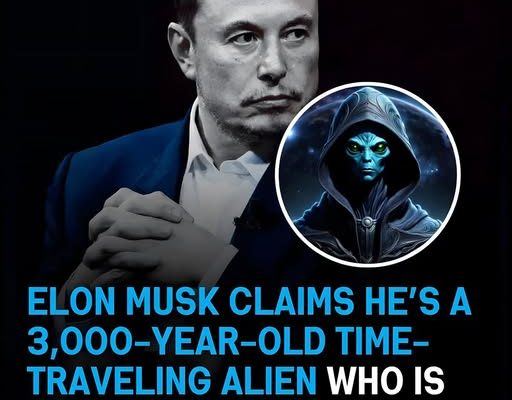Elon Musk’s bold claim of being a 3,000-year-old time-traveling alien has sparked widespread curiosity, humor, and debate across social media.
Elon Musk, the billionaire entrepreneur and CEO of SpaceX and Tesla, is no stranger to making headlines with his unconventional remarks. However, his recent claim has taken the internet by storm: Musk stated on X (formerly Twitter) that he is a 3,000-year-old time-traveling alien who is on a mission to return to his home planet. This outlandish assertion has left many wondering whether he was joking, making a veiled philosophical point, or simply adding fuel to his enigmatic public persona.
Known for his eccentric sense of humour and tendency to spark controversy, Musk’s declaration has ignited a wave of reactions across social media. From disbelief to humour, his statement taps into the intersection of modern mythology and celebrity influence, reminding us of his unique ability to keep the world guessing. This article dives deeper into what was said, how the world responded, and the broader implications of such claims in today’s media landscape.

The Claim In Detail
Elon Musk’s assertion about being a 3,000-year-old time-traveling alien unfolded in a typical Musk fashion: through a cryptic post on X (formerly Twitter). In his statement, Musk hinted at his extraterrestrial origins, claiming that he has been traversing time and space, possibly in an attempt to return to his home planet. While the post did not provide any context or follow-up, it sparked a frenzy of speculation and debate among his followers.
This is not the first time Musk has leaned into otherworldly narratives about himself. In previous social media exchanges, he has jestingly referred to himself as an alien, even calling his ideas and innovations “proof” of his otherworldly intelligence. Some have interpreted these remarks as Musk’s playful engagement with internet memes and culture, while others believe they might reflect his fascination with space and the unknown.
The ambiguity of his claim—whether it was a genuine expression, satire, or a calculated move to captivate his audience—left many grappling with its intent. Regardless of his motivations, the post added another layer to Musk’s already enigmatic persona, blurring the lines between humour, self-mythologizing, and public performance.
Public & Media Reaction
Elon Musk’s claim about being a 3,000-year-old time-traveling alien sparked an immediate and dramatic response across social media platforms and news outlets. His followers on X were quick to chime in, with reactions ranging from humorous takes to outright disbelief. Many users took the claim as another example of Musk’s signature dry humour, jokingly asking him for time-travel tips or speculating about the advanced alien technologies he might possess. Memes flooded the platform within hours, with Musk depicted as an intergalactic traveller and even as a vampire who has existed through millennia. The light-hearted response underscored how Musk’s audience often embraces his eccentricities as part of his brand.
In contrast, some media outlets approached the statement with a blend of scepticism and analysis. While most dismissed the comment as a tongue-in-cheek remark, a few commentators speculated on the possible motivations behind it. Could it have been a clever ploy to draw attention, a philosophical metaphor about human innovation, or simply an offhand joke that snowballed into something larger? Regardless, the statement captured widespread attention, with headlines ranging from playful puns to serious dissection of Musk’s persona. News platforms leaned into the spectacle, reflecting the growing trend of elevating celebrity comments—no matter how bizarre—into cultural moments.
Interestingly, not all reactions were positive or playful. Some critics used the moment to question Musk’s increasing tendency to blur the lines between humour and responsibility, particularly as one of the most influential figures in the tech industry. These voices argued that his statements, even those made in jest, carry weight and can influence public perception. Whether seen as a harmless quip or an ill-timed distraction, Musk’s alien remark once again highlighted his uncanny ability to dominate the news cycle and spark a mix of wonder, amusement, and critique.

Elon Musk’s History of Unconventional Statements
Elon Musk has long been known for his eccentric and unpredictable communication style, particularly on social media. His declaration of being a time-traveling alien isn’t the first time he’s captured public attention with unconventional remarks. Over the years, Musk has cultivated a reputation for blending humour, curiosity, and controversy in his statements, often leaving the public to decipher his true intentions.
One of Musk’s most infamous moments came when he referred to himself as an alien during an interview, claiming that his ability to innovate could only be explained by extraterrestrial origins. While clearly said in jest, the comment quickly became a cultural reference, sparking memes and discussions about Musk’s seemingly otherworldly ability to disrupt industries. Similarly, his cryptic tweets, such as “Nuke Mars” or “Let’s create a mechagodzilla,” often generate both laughter and confusion, blurring the line between legitimate ideas and playful musings.
Musk’s penchant for such remarks has also led to significant backlash. His offhand comments about taking Tesla private at $420 per share famously resulted in an SEC investigation, showcasing how his words can carry real-world consequences. Even so, Musk continues to embrace his role as a provocateur, frequently posting about topics ranging from advanced AI to existential threats facing humanity. His tendency to provoke, entertain, and challenge norms reflects a broader strategy of keeping himself—and by extension, his ventures—constantly in the public eye.
What makes Musk’s statements resonate, whether they’re about time travel, colonizing Mars, or artificial intelligence, is his ability to tap into a collective sense of curiosity and wonder. By weaving together humour and grandiose ideas, Musk has effectively turned his public persona into a modern mythos. His claim about being a 3,000-year-old alien is just the latest chapter in this ongoing narrative, reinforcing his unique position as both an innovator and a cultural phenomenon.
Psychological & Social Perspectives
Elon Musk’s declaration of being a time-traveling alien can be examined not only through the lens of his unique persona but also from psychological and social perspectives. Experts suggest that such statements by influential figures often serve multiple purposes, whether intentional or subconscious. Musk’s playful yet provocative comments tap into a shared human fascination with the unknown, effectively engaging his audience by blending humour, mystery, and a touch of absurdity. This ability to captivate and entertain is a hallmark of his communication strategy, ensuring his relevance in public discourse.
From a psychological standpoint, Musk’s statements may reflect his understanding of how narratives shape public perception. As one of the world’s most recognizable innovators, Musk is keenly aware of the cultural power he wields. By making claims that straddle the line between reality and satire, he not only sustains interest in his persona but also challenges his audience to think beyond conventional boundaries. Such remarks encourage a mix of disbelief and curiosity, prompting discussions that often circle back to his larger goals, such as advancing space exploration or addressing existential risks. In this way, Musk leverages his statements to inspire engagement, even when the content itself seems far-fetched.
Socially, Musk’s alien comment also highlights the modern phenomenon of celebrity mythmaking. In an era where social media amplifies every word and action, public figures like Musk often construct larger-than-life personas that resonate with their followers. For Musk, portraying himself as an alien or time traveller not only underscores his association with futuristic technologies but also feeds into a cultural narrative that celebrates the extraordinary. However, experts caution that such behaviour can have unintended consequences, particularly if audiences struggle to distinguish between satire and reality. In Musk’s case, his remarks reinforce his identity as a disruptor while also opening the door to critique about the responsibility of high-profile individuals to communicate more transparently.
Ultimately, Musk’s statement can be seen as a calculated move to blur the lines between humour, philosophy, and self-promotion. While many may dismiss it as a joke, it also reflects a deeper trend of how influential figures use narratives to shape their public identities. Whether perceived as a harmless quip or a deliberate effort to provoke thought, Musk’s alien comment serves as a fascinating case study in the intersection of psychology, media, and cultural influence.



